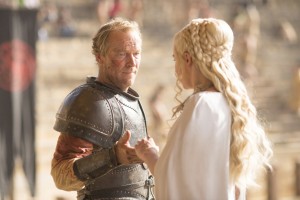In the war zone that is the fall TV season, it’s important to pick out the gems hidden in the media mesh. Each week, A&E columnist Sebastian Torrelio will profile one new show and one returning show that share a connection, detailing how they may make those after-school hours more meaningful.
There is not a single person reading this column who I need to describe the concept of “Game of Thrones” to. It’s today’s fantasy show of choice, novel adaptation of choice and friend-gathering occasion of choice.
Fortunately, “Game of Thrones” is now so ubiquitous that it isn’t hard to pitch and evolve the setting even further. From History Channel’s “Vikings” to FX’s “The Bastard Executioner,” old European-set violence featuring swords and beards is a whole genre unto itself in today’s television landscape, and no premiering show capitalizes on the period quite like “The Last Kingdom.”
A BBC America show based on Bernard Cornwell’s novels of the same name, “The Last Kingdom” primarily spins the tale of Uhtred of Bebbanburg (Alexander Dreymon), a Saxon nobleman who is taken by raiding Vikings at a young age. He is raised Norse until he grows independent enough to wander the world on his own, at which point Saxon king Alfred (David Dawson) seeks Uhtred out and begins to watch over him.
Psychologically, Uhtred’s clash of opposing heritages causes him great turmoil as he spends most of his days trying to survive in the harsh landscape. Dreymon plays the role as a rugged young man with the talent and will to make the best of his situation despite the tragedy and fighting that encompass his world.
But “The Last Kingdom” aims for a grander scope than its one-man story suggests. Part of that relies on its talented cast, primarily supported by Emily Cox as Brida, a child captured around the same time as Uhtred who later becomes his lover. There are also the grand set pieces – the battles are big, bold and bloody, wiping away any presumed exoticism of viking culture in the process.
“The Last Kingdom” provides a deeper analysis into the trend of historical European shows that explain war and cultural struggles through cruelty. The Vikings, often depicted as merciless savages, are not only the villains of the show: Alfred, the leader who would become historically known for uniting England under one rule, is often looked at as a tempered manipulator who minds how far he strays into the territory of corruption.
Uhtred’s story is really less about himself and more about the greater vision for England that he is barreling towards. “The Last Kingdom” immerses viewers in its world through clear storytelling and eventful climaxes; the latter being the biggest connection to “Game of Thrones” that it has, and why many of either show’s fans should be able to crossover with ease.
Author George R. R. Martin’s world in “Game of Thrones” is so immense that it’s sometimes hard to grasp the entire context of what is happening, even after several rereadings and rewatchings. What truly helps move the story along is the plethora of defined, interesting characters that take very clear sides to every concern in the kingdom of Westeros, then proceeding to kill each other over them.
The wars waging on between House Targaryen, House Lannister, House Stark and whoever else wants to join the party that episode not only bring in viewers, but have come to set a standard for adult and young adult television. What would HBO, as well as fellow paid subscription services Starz, Cinemax and Showtime, be without their daunting budgets to spend on dragons, pirates, well-known actors, gritty special effects and hundreds of dead bodies.

“Game of Thrones” is the gold standard for accessible, acclaimed television because it has all of the above. But in comparison, “The Last Kingdom” proves that even “Thrones” can be tighter and more succinct in its storytelling while still remaining morbidly interesting.
As tragically chaotic as the life of a certain 100-percent-guaranteed-to-return-next-season “Game of Thrones” character is, Uhtred’s life isn’t much less unpredictable. It’s definitely as thrilling when it comes down to themes of survival and death, “Thrones” just involves more magic and zombies, and who can ever get enough of those?
Above all else though, “Game of Thrones” and “The Last Kingdom” share a central message: It would be terrible to live in old England. Or fantasy England. Any foreboding type of nonpresent-day England, really.
